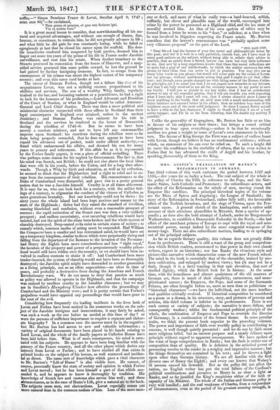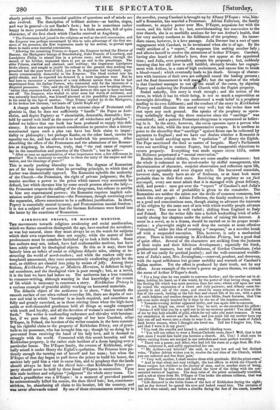MRS. AUSTIN'S TRANSLATION OF RANICE'S REFORMATION IN GERMANY.
THE third volume of this work embraces the period between 1527 and 1535,—few years for so bulky a book. The real subject of the whole is
the policy of Charles the Fifth in reference to the Pope, and the Ger- manic States, both Catholic and Protestant; the subordinate actors, and the effect of the Reformation on the minds of men, moving round the Emperor like satellites. The principal historical topics of the volume are the Diets of Spires and Augsburg; the League of Smalcald; the story of the Reformation in Switzerland, rather fully told ; the favourable effect of the Turkish invasions, and the siege of Vienna, upon the Pro- testant cause. A general sketch of the Anabaptists, and a rather mild account of their atrocious absurdities in Minster, form a species of ap- pendix ; as does also the bold attempt of Lubeck,- under its Burgomaster Wullenweber, to establish a Democratic Federally in the North,—the last effort of the merchant princes of Europe to cope with the royal and aris- tocratical power, except indeed by the more congenial weapons of the money-bags. There are also subordinate matters, leading to or springing out of the principal subjects.
As far as regards literary quality, this volume does not greatly differ from its predecessors. There is still a want of the grasp and comprehen- sion which British readers, accustomed to that power in their own classic writers, expect in an historian ; nor has Ranke the vivacious style and picture-like narrative which characterize some of the new French school.
The mind in the book is essentially that of the chronicler, trained by mo- dern cultivation, and enlarged by modern views ; but (it may not be a fault, though it is a fact) wanting in that epic elevation, that sort of studied dignity, which the British look for in history. At the same time, with the homeliness and almost quaintness of the old masters of German art, there is mach of their simplicity, earnestness, and unso- phisticated nature ; the Emperor, the Pope, and some of the Germanic Princes, are often brought before us, more as men than as politicians or "historical characters"—we have the individual, not the mere intellec- tual qualities critically evolved. If historical composition be considered as a poem or a drama, in its structure, story, and pictures of persons and actions, this third volume is inferior to its predecessors. There is not such extent or variety of subjects ; the narrative is more diffuse, and consequently weaker; whilst the fundamental political principle of the
whole, the combination of Emperor and Pope to override the liberties of Germany, is a continuation of the former theme. In some peculiar traits, we think the present book superior to the preceding volumes. The power and importance of faith over worldly policy in contributing to success, is well though quietly presented : and we do not by faith mean mere religions belief, but an earnest purpose and a steady reliance upon principle without regard to apparent consequences. We have spoken of the want of large comprehension in Ranke; but the fault is rather one of composition than of quality. He is deficient in the artistical power of
presenting results to the reader in a weighty and impressive manner; but the things themselves are contained in his text; and he throws a light upon other than German history. We are all familiar with the first
divorce case of Henry the Eighth ; and every one knows that woisey's ill success caused his downfall. But as the policy did not affect the nation, no English writer has put the total failure of the Cardinal's political combinations and promises to Henry in so clear a light as Ranke, and so far justified the King's suspicions either of the faith or capacity of his Minister. The whole of the Italian and German policy 113 very well handled ; and the real weakness of Charles, from a conjuncture of circumstances, even at the period of his greatest seeming strength, is
clearly pointed out. The essential qualities of questions and of minds are also evolved. The description of brilliant actions—as battles, sieges, and war in general—is not Ranke's forte ; but he is sometimes rather happy in more peaceful sketches. Here is a little anecdote, full of quiet character, of the first check which Charles received at Augsburg.
"The Protestants had joined in the religions as well as the civil ceremonies; and the Emperor was perhaps encouraged by this to take advantage of the first mo- ment of his presence, the first impression made by his arrival, to prevail upon them to make some material concessions.
"Allowing the remaining Princes to depart, the Emperor invited the Elector of Saxony, the Markgrave George of Brandenburg, Duke Francis of Luneburg, and Landgrave Philip, to attend him in a private room; and there, through the mouth of his brother, requested them to put an end to the preechings. The elder Princes, startled and alarmed, said nothing; the impetuous Landgrave broke silence, and sought to justify his refusal on the ground that nothing was preached but the pure word of God, just as St. Augustine had enjoined; argu- ments consummately distasteful to the Emperor. The blood rushed into his pallid cheeks, and he repeated his demand in a more imperious tone. But he Lad here to encounter a resistance of a very different nature from that he had experienced from the Italian Powers, who contended only for the interests of a disputed possession. ' Sire,' said the old Markgrave George. now breaking silence, 'rather than renounce God's word, I will kneel down on this spot to have my head cut off.' The Emperor, who wished to utter none but words of mildness, and was naturally benevolent, was himself alarmed at the possibility thus presented to his mind by the lips of another. 'Dear Prince,' replied he to the Markgrave, in his broken low German, not heads off' (nicht Kiipfe ab)."
A charge made against Ranke by an extreme class of Protestant reli- gionists is, that he does not sufficiently " handle " the Popes as Anti- christ, and depict Papistry as " abominable, detestable, damnable ; fore- told by sacred writ itself as the source of all wickedness and pollution" : indeed we believe that one book has been produced to supply this defi- ciency. It does not require much consideration to perceive that a history constructed upon such a plan can have but little claim to impar- tiality or philosophy; but perhaps Ranke, on the other hand, carries his equality too far, and has allowed it to hoodwink his penetration. After describing the offers of the Protestants and the admissions of the Roman- ists at Augsburg, he observes, truly, that " the real cause of rupture lay in the constitution and practice of the Church " ; but he adds— "After an near an approximation, of what importance were a few differences in practice? Was it necessary to sacrifice to them the unity of the empire and the nation, and the blessings of peace?"
This is surely pushing liberality too far. The dogmas of Romanism are of far less importance than its pervading principle, to which that of Luther was diametrically opposel. The Romanist upholds the authority of the Church—the Protestant, the right of private judgment; the Ro- manist ascribes a power to the priest which cannot very accurately be defined, but which elevates him by some occult process above the laity— the Protestant respects the calling of the clergyman, but refuses to ascribe to him any supernatural powers ; the Romanist requires implicit sub- mission under pain of damnation—the Protestant, though sorrowing over the separatist, allows conscience to be a sufficient justification. In short, Popery is essentially mental tyranny, and Protestantism mental freedom : it is not a subject of sorrow that the German Reformers were forced into the latter by the exactions of Romanism.



























 Previous page
Previous page